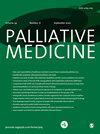预先护理规划倡议中的沟通过程:服务评估的社会生态视角
IF 3.6
2区 医学
Q1 HEALTH CARE SCIENCES & SERVICES
引用次数: 0
摘要
背景:预先护理计划倡议越来越广泛,人们对医疗服务提供者参与护理目标对话的期望也越来越高。结果:使用恒定比较法,然后将主题定性映射到社会生态模型的各个层次,确定了四个主题和相应的社会生态层次:护理目标沟通培训(政策、社区和机构)要求各医疗机构提供更多的资源和更好的信息,以减少医疗服务提供者的误解,促进机构文化对预先护理计划的投入;跨专业沟通(人际)表明需要护理团队的协调,以促进护理目标信息传递的连续性;文档中的沟通(机构、人际和个人)强调了捕捉护理目标偏好背景的必要性;患者/家属沟通(人际和个人)鼓励尽早提供材料和信息资源,以促进关系的建立,并为确定护理目标做好准备。结论:研究结果表明,除了患者与医疗服务提供者之间的人际交流外,还需要对如何讨论护理目标进行评估,这也为应用社会生态模型更好地了解护理目标交流过程提供了机会,包括改善护理目标的启动和记录的机会。本文章由计算机程序翻译,如有差异,请以英文原文为准。
Communication processes in an advance care planning initiative: A socio-ecological perspective for service evaluation
Background:Advance care planning initiatives are becoming more widespread, increasing expectations for providers to engage in goals of care conversations. However, less is known about how providers communicate advance care planning within and throughout a health care system.Aim:To explore perspectives of communication processes in the rollout of an advance care planning initiative.Design:Theoretically informed secondary analysis of 31 semi-structured interviews.Setting/Participants:Key partners in a Veterans Health Administration goals of care initiative.Results:Using the constant comparative approach followed by qualitative mapping of themes to the layers of the Socio-Ecological Model, four themes and corresponding Socio-Ecological layers were identified: Goals of Care Communication Training (Policy, Community, and Institutional) requires more resources across sites and better messaging to reduce provider misconceptions and promote an institutional culture invested in advance care planning; Interprofessional Communication (Interpersonal) suggests care team coordination is needed to facilitate continuity in goals of care messaging; Communication in Documentation (Institutional, Interpersonal, and Intrapersonal) highlights the need for capturing the context for goals of care preferences; and Patient/Family Communication (Interpersonal and Intrapersonal) encourages offering materials and informational resources early to facilitate rapport building and readiness to determine goals of care.Conclusions:Findings support the need for initiatives to incorporate an evaluation of how goals of care are discussed beyond the interpersonal exchange between patient and provider and signal opportunities for applying the Socio-Ecological Model to better understand goals of care communication processes, including opportunities to improve initiation and documentation of goals of care.
求助全文
通过发布文献求助,成功后即可免费获取论文全文。
去求助
来源期刊

Palliative Medicine
医学-公共卫生、环境卫生与职业卫生
CiteScore
7.60
自引率
9.10%
发文量
125
审稿时长
6-12 weeks
期刊介绍:
Palliative Medicine is a highly ranked, peer reviewed scholarly journal dedicated to improving knowledge and clinical practice in the palliative care of patients with far advanced disease. This outstanding journal features editorials, original papers, review articles, case reports, correspondence and book reviews. Essential reading for all members of the palliative care team. This journal is a member of the Committee on Publication Ethics (COPE).
 求助内容:
求助内容: 应助结果提醒方式:
应助结果提醒方式:


